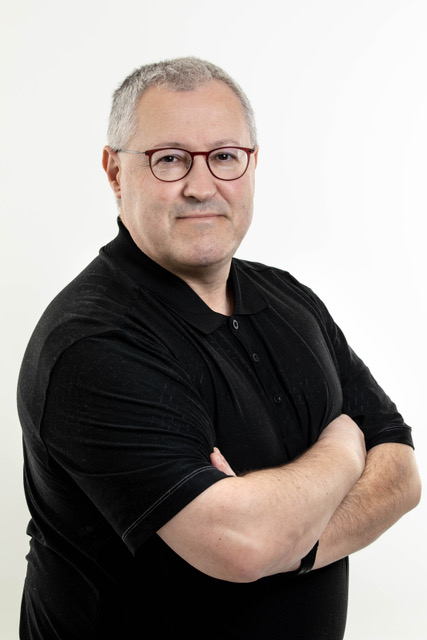In this new BJSM blog series, we ask a range of senior practitioners and researchers in Sport and Exercise medicine about their career, and what advice they would give to students who may find themselves in the same shoes that they were once in. The series is kindly coordinated by Dr Corina Bello.

Mario Bizzini, PhD, PT is as a research associate at the Human Performance Lab, Schulthess Clinic in Zürich (Switzerland), where he works since more than 30 years. He has a Master of Science degree (MSc) from the University of Pittsburgh (2001), and a Doctoral degree (PhD) from the Norwegian School of Sports Sciences (2010). He was also involved during 12 years (2002-2016) with the FIFA Medical Research and Assessment Center (F-MARC). His research interests focus on prevention and rehabilitation of sports injuries. Mario has at today 110 peer-reviewed publications, 6 books, and 19 book chapters on these topics. He is Deputy Editor of the British Journal of Sports Medicine and in the Editorial Board of the International Journal of Sports Physical Therapy. Mario, a former board member of the International Federation of Sports Physical Therapy, is currently the Vice-President of the Swiss Sport Physiotherapy Association. He’s a rehabilitation consultant for professional ice hockey and football teams, and has worked at three Summer Olympic Games, three FIFA World Cups, and two FIFA Women’s World Cups.
Personal interests/passions outside of work
- Reading Italian western comics
- Walking outdoors
- Family time
Personal Career or Sports Mantra
- “Work hard and you’ll get rewarded”
What attracted you to the specialty you now work in?
When I was adolescent, during 3-4 summers I always spent some weeks with my cousin, who was playing professional football in Geneva (Servette FC). I was going with him at every training session, and sometimes I saw his treatments for some injury or recovery. To live this was fascinating to me, and since then I knew that I would go on to study physiotherapy and dreamed to work with athletes. More than 30 years later, I can say that I even surpassed my dreams.
What was the best decision you ever made?
After 10 years working as PT/sports PT I needed a challenge, so I moved (with my family) to Pittsburgh, USA and did a MSc at the University of Pittsburgh (2000-2001). I also had the chance to get involved in many activities (incl. some research projects) at the UPMC Sports Medicine Center. A great experience, which had a great impact on my career.
What was the biggest risk you ever took? How do you feel about it now? –
I cannot speak of “risk taken only from myself”, but rather on “risk” taken as a part of the medical team, especially when working with professional athletes. There’re situations, where an injury is not 100% healed, and a certain risk for re-injury is still present for the athlete when returning to compete. From the medical team side, everyone (incl. the sports PT) is doing the max to treat/help the athlete at best, and together with him/her and the other staff members (conditioning trainers, coaches), we try to reach a shared-decision making concerning “when to play”. This is not always possible, especially when the game is important/very important, and the coach wants this athlete in the line-up: in these moments (even if the athlete is mentally ready) you’re always nervous and hoping that nothing “bad” will happen.
I lived those situations few times (as an example with a player after a complex knee surgery, with a knee maybe at 90%, but with a lack of full training sessions), and luckily everything went well. Yes, in those cases, besides the best possible injury management, everybody (you, the athlete, the coach, the staff) always needs a bit of luck…
What 3 things are you most thankful for in your sports PT/medical career?
First, I was lucky to work (almost from the beginning) at the Schulthess Clinic: I found a top orthopaedic and sports medicine clinic, with many opportunities, many top specialists, and moreover a place like home. Second, I had the chance to have few but great mentors, which greatly impacted my work. I would like to acknowledge Prof Jiri Dvorak, who was instrumental for my career in sports injury prevention. Third, I’m grateful to have known so many national and international colleagues, which helped me to have a worldwide network (something that is very enriching).
What is your greatest strength?
Stay humble, patient and calm.
What is the most challenging project you have ever undertaken?
For sure the “11+ project” when I was involved with F-MARC. Especially the dissemination/implementation phase with many travels around the world has been very demanding – but also very rewarding.
What advice would you give to a younger version of yourself – say between the age of 25-30 years-old?
Try to get out of the comfort zone early. In the first years I visited some clinics, institutions in other countries (Europe, USA), and also attended some conferences (even if I was maybe not “ready” for). Those moments are very important, as they allow you to see/experience/exchange with foreign colleagues. In my opinion it’s crucial for our own personal and professional development.
What tips would you give to students/junior sports PTs/doctors to improve their career prospects?
Try to find some fellowship possibilities in top clinics/institutes, which can help to enhance your clinical knowledge and skills. Look for opportunities to work at sports events or with sports teams at any levels. Often people think it’s “minor” to get involved at low level, but it’s really there that you can (or you have to) start building up experiences on the field (something very important). Look for mentor/s a well, so that you can have the support needed at the early stages.
Thank you, Mario!